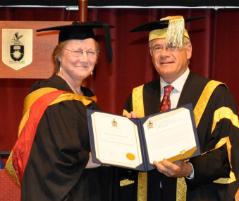Engineering leader 'refused to bring lambs to slaughter'
Published on 18 February, 2010
At one of the decisive points of her career, Elizabeth Taylor confronted a Dean of Engineering and refused to bring ‘any more lambs to the slaughter' until the Faculty became more accommodating towards female students.
Elizabeth had herself toughed it out to complete her engineering degree, in a climate where few staff and not many of the 250 male students bothered to talk to her for the first 12 months, so she realised that many girls were being turned off entering the profession at the first hurdle.

Elizabeth becomes an Emeritus Professor
"I struggled, sitting on my own ... the ice did melt once they realised I was going to stay. I ended up being friends with the Italian and Greek boys, the other outsiders - we used to play cards and I was invited to their family gatherings - because the Australians were generally only interested in mateship and did not want to know the girl."
Elizabeth came from a medical family but was directed towards engineering while at senior school. [Although her husband is also an engineer, none of their children have followed their parents' professional footsteps.]
After an early career with the Maritime Services Board and having returned to campus as an academic, Elizabeth set about reflecting industry wishes that technical programs be balanced by broader social perspectives.
"My job at UTS was to bring a broader perspective into the curriculum and our subject called contextual studies covered everything from psychology, philosophy and finance ... all in 12 weeks," she said.
"AUQA (the quality agency) came to visit and grilled us for an hour about this strange subject.
"By the time I left UTS they had a suite of subjects about how the technical material connects to the wider decision-making processes."
Professor Elizabeth Taylor AO recently left her role as an Executive Dean and Pro-Vice-Chancellor at CQUniversity, but has vowed to continue her relationship with the institution.
After 6 consecutive years listed among ‘Australia's top 100 most influential engineers', and after serving on many professional bodies, she will take a break to consider her future and to consolidate her recovery after treatments for cancer.
"I'm still passionate about higher education and the engineering profession and will be looking around to see the best way to contribute amidst the challenges ahead," she said.
"One plus is that the engineering profession is now more open to diversity," she said.
"Twenty years ago the Australasian Association for Engineering Education was a refuge for greens, women and those interested in Learning and Teaching.
"Now the profession can accommodate diversity more readily and there's a greater sense of relationship with the community."
Despite the wider embraces of the profession, Professor Taylor recognises that the number of female engineering students entering university programs has actually been ‘going backwards'. She says there is an ongoing perception that engineering is just about maths and equations when in fact it also involves human interaction and social networks.
Professor Taylor hopes forthcoming peak body "Make it So" campaign linking engineering solutions to our quality of life will help to remedy these negative perceptions.
Elizabeth is proud of CQUniversity's work and community-integrated learning ethos, our associate degrees in partnership with industry and our series of John Holland Group case studies. The high-calibre senior managers providing input are proving to be great role models for students.
When asked about the role of regional campuses Professor Taylor commented:
"They are an important connection to community. We need to do more to be proud of who we are and have those conversations at State and Federal level.
"Regional education and research needs to be supported appropriately. To achieve this we need to increase understanding of what a regional university is all about. Otherwise the stumbling block is an assumption that all knowledge comes from Cambridge and all we are doing is regurgitating known 'truths' rather than recognising that 'truth' is the response to the particular circumstances and that therefore regional universities have an important intellectual role.
"I have enjoyed harnessing the passion and supporting staff ... we have a lot of people with fantastic ideas who take what was needed in our CQ communities and translate this into innovative curriculum and innovative research with international relevance."
"We should be very proud of our record and put back to government that, as a regional university, we provide different solutions than those from big city universities. It's like the role of biodiversity in environmental sustainability. If we end up with just one model of universities, we won't be as successful intellectually as a nation!"

